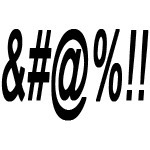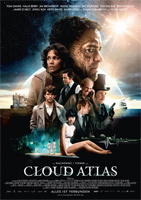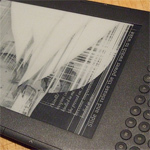Dan Thompson's Blog, page 14
December 17, 2012
Except… I Didn’t Say Fudge
 In the classic film “A Christmas Story”, little Ralphie accidently sends the lug nuts flying while helping his father change a flat tire, he cries out an exasperated “FUUUUUDGE!!” Except, as the voiceover narration informs us, “I didn’t say fudge. I said THE word, the big one, the queen-mother of dirty words, the F-dash-dash-dash word!”
In the classic film “A Christmas Story”, little Ralphie accidently sends the lug nuts flying while helping his father change a flat tire, he cries out an exasperated “FUUUUUDGE!!” Except, as the voiceover narration informs us, “I didn’t say fudge. I said THE word, the big one, the queen-mother of dirty words, the F-dash-dash-dash word!”
An article on curse words by Jo Eberhardt reminded me of the angst I put myself through when I dropped the F-bomb in the opening chapter of my novel “Beneath the Sky”. It’s not that I’ve never said the word. In my twenties, it was my favorite expletive… and noun… and verb, adjective, adverb, conjunction, and on occasion preposition. Or was that proprosition? Whatever – I just mean to say that I’m familiar with its usage.
 But after a similar incident to Ralphie’s as a child – and one bar of Lava-brand soap later – I found myself freezing up over the word. I mean, really… what would my mother think if she ever saw this? It’s not like she’s never heard the word – note the incident with the Lava soap – and I’m sure she’s run into in any number of books she’s read. And it’s not like I used it gratuitously. I put it in early to draw a distinction between the worldly captain of the merchant ship and the overtly devout passengers of God’s Chariot. But still. “Did you have to use that word?”
But after a similar incident to Ralphie’s as a child – and one bar of Lava-brand soap later – I found myself freezing up over the word. I mean, really… what would my mother think if she ever saw this? It’s not like she’s never heard the word – note the incident with the Lava soap – and I’m sure she’s run into in any number of books she’s read. And it’s not like I used it gratuitously. I put it in early to draw a distinction between the worldly captain of the merchant ship and the overtly devout passengers of God’s Chariot. But still. “Did you have to use that word?”
I got over it, of course, and plowed ahead with the f-ing f-word for f-‘s sake. But my anxiety over it got me to thinking about when we curse, when we don’t, and why.
I used to curse up a storm, but I don’t so much anymore. You see, I have kids now, and I find I censor myself around them. I also censor myself in front of my extended family, business contacts, school teachers, employers, police officers, and judges in their Texas courtrooms. “My apologies, your honor, but when I called you a cockwaffle, what I really meant was…” I’m sure you do the same.
But get me in front of some of my rowdier friends, and we’re stretching the limits of polite discussion like a distended, gaping… um, blog entry. Yeah. But we’d never say those things in front of family, teachers, etc. Least of all, our mothers.
But what about fictional characters? How much do they curse, and who do they censor themselves in front of?
Consider that coarse forklift operator at the loading docks. He can make a bartender faint with his language, but he doesn’t dare say those things in front of his mother, or his childhood priest, or that sweet lady who runs the coffee shop near his apartment.
Or maybe that upper crust socialite? She would never use the f-bomb with her husband or bridge partners, but she gets shockingly explicit with her hairdresser.
It would be easy to say it’s all about respect, that you censor yourself around people you respect and curse at those you don’t, but it’s not at all that simple. Soldiers curse with each other all the time amongst equal or lower ranks, but they would be quick to tell you how much they respect each other. The same is true for any tight group coworkers. Yet they don’t curse at their bosses or officers.
There’s definitely an element of intimacy to it, but it’s not sexual intimacy – more like cultural intimacy. We often curse when surrounded by other people who are… I suppose, in our club. It doesn’t have to have a building and a membership list. It merely has to be recognizably separate from the outside world. We’re in the locker room, the cigar lounge, the fishing boat, or the salon. As long as “it’s just us”, we are willing to share that side of us.
But that’s still not all of it. Specific people in my life, who might curse up a storm of their own somewhere else, are still off-limits. If they showed up as a full-fledged member of whatever cursing club I was in, I suspect we would both clam up. Surely, you’ve run into this yourself and that awkward pause as you suddenly shift gears on your vernacular.
So anyway, I don’t have a hard and fast rule for knowing who I’m comfortable cursing in front of vs. who forces me back to darn and fiddlesticks, but I always seem to know it instantly without any conscious analysis. Somehow, this speaks volumes about each of those particular relationships, but I don’t know precisely what it says.
So, who do you curse in front of? Who do you censor yourself in front of? And when you see a fictional character shift language, what does it tell you about him?
December 14, 2012
Review: Cold Days, by Jim Butcher

 This is #14 in the Dresden Files series, and I’ve been eagerly awaiting it for over a year. Combine that with the fact that the last couple of books (particularly #12, Changes) were so mind-blowingly awesome, and you can imagine that this one came in with some pretty high expectations to meet. It did pretty well, but it fell just a little short of meeting those expectations. Had it been just some random book by another author, I’d probably be raving all about it. As it is, I find myself bouncing between loving it and feeling a little disappointed in it. Or maybe that’s just the post-high blues settling in.
This is #14 in the Dresden Files series, and I’ve been eagerly awaiting it for over a year. Combine that with the fact that the last couple of books (particularly #12, Changes) were so mind-blowingly awesome, and you can imagine that this one came in with some pretty high expectations to meet. It did pretty well, but it fell just a little short of meeting those expectations. Had it been just some random book by another author, I’d probably be raving all about it. As it is, I find myself bouncing between loving it and feeling a little disappointed in it. Or maybe that’s just the post-high blues settling in.
So, what can I say about a book and series with so many big reveals without actually spoiling it? A friend and I were jokingly messaging each other while reading it, saying things like, “Just wait until Harry and some other character do that thing in the place… you know, with the other guy.”
So yeah… it’s kind of hard to say much without getting all spoilerific, but here’s my best attempt at being specific enough to review it without being so specific as to spoil it.
While the first eleven books were about Harry’s adventures as Chicago’s only professional wizard and all the complications that entails, book #12 (Changes)… well, you know, changed things. Book #13 was mostly about the aftereffects of that and attempting some notion of recovery.
Cold Days picks up after that and shows Harry settling into something of a new role. Then he gets his first job in that new role, and it’s a doozy. In fact, it’s virtually impossible. But Harry’s life has never been as simple as presenting him with a tough problem, so it all gets much more complicated with struggling loyalties, questionable allies, plots within plots, and a world-ending timebomb ticking away. And of course, Harry saves the day with his usual wit and well-earned angst. The ending was bittersweet, with victory being filled with loss, but when did Harry every have a truly happy ending?
About the only nit I have to pick was that Butcher did a bit of preaching in the middle of the book. It happened to be a message I wholeheartedly agree with (i.e. homosexuals are OK, and even if you disagree you should adopt a live and let live approach), but it kind of stuck out from the surrounding material as the author preaching at us rather than Harry Dresden dishing out his own irreverent attitude. It did not blend in with the rest of the story and felt kind of tacked on. If Jim Butcher really wants to communicate that message, he would be better off writing a book where he showed it to be true rather than taking a five-minute break to hit us up with a public service announcement.
Still, it was good to see many of the old gang, but we didn’t see everyone. The world has certainly changed since Changes, and not all for the better. Mostly though, Cold Days revealed more about the dark subtle forces moving through the world and set up the shape of the background conflict for the next several books. I’m sure there will be diversions and unrelated struggles, but I think this set up the main storyline for the next dozen books.
I just hope that the next book picks up the storyline in short order and not two years later… which coincidentally is also when I wish the next book would come out, i.e. in short order.
*taps at veins*
Gotta get more Dresden!
December 12, 2012
The Next Big Thing Meme
Rhonda Eudaly, one of the Four Redheads of the Apocalypse, did a meme recently on her upcoming book Vagabond. She herself had been tagged by J. Kathleen Cheney, but Rhonda did not get any volunteers to be tagged for a followup. I’m was a little late to the party to get officially tagged, but I figured I would do the meme anyway.
So, here are my answers for the “Next Big Thing” meme. If I could actually tag whomever I wanted, I would tag Nathan Lowell, C.J. Cherryh, Elizabeth Moon, Jack McDevitt, and Jim Butcher.
1) What is the working title of your next book?
Ships of My Fathers
2) Where did the idea come from for the book?
This one bubbled up out of a number of sources, but the central event was the death of my father seven years ago. Then, quite some time later, I heard a tale about someone discovering all manner of things about their father after his death, including details of some secret life the father had led. From that, I began to wonder how I would have reacted if I discovered that my father had actually been some kind of secret government agent, or a mobster, or an elite assassin for dark powers… and what would I do if they wanted me pick up where my father left off?
3) What genre does your book fall under?
Space Opera, which is basically Science Fiction where we get to have faster-than-light travel and the occasional ray gun. It’s written in the same universe as my first novel “Beneath the Sky”, though it is not a sequel. It’s just another story happening elsewhere in the neighborhood.
4) What actors would you choose to play the part of your characters in a movie rendition?
This is hard for me, because I don’t really follow actors that closely. I’d probably want an older Nathan Fillion as the father, but it’s a very tiny part. It’s just that’s the kind of guy the father was. I think I’d want Joseph Gordon-Levitt for the protagonist, but I’d need him younger than he is now. He’s had that boyish innocence when he was younger, and he’s grown into a tougher figure. As for the rest… wow, too many characters to cast here.
5) What is the one sentence synopsis of your book?
On the cusp of adulthood, Michael Fletcher finds out that his father Malcom was not what he appeared, and Michael sets out to find out who he really was and what happened to his mother seventeen years ago.
6) Will your book be self-published or represented by an agency?
It will be self-published. I already have feedback from my first set of beta readers, and I’m doing another pass at the edits. It might need one more set of fresh eyes, but I hope to be doing the copy edits by late January and releasing it by March. (And kudos to Rhonda for pointing out that self-publishing and getting an agent are not the only two options in this business.)
7) How long did it take you to write the first draft of the manuscript?
Two months, and that wasn’t even full-time, since I took off about three weeks in the middle. Of the four novels I’ve written, this one was the fastest as well as the cleanest.
8) What other books would you compare this story to within your genre?
I would like to compare it (and the four that will follow) to the Vatta books by Elizabeth Moon or perhaps some of the Merchanter books by C.J. Cherryh, but I’m still too much of a fan-boy of these two legends to say I’m in their league.
9) Who or what inspired you to write this book?
I suppose it would be easiest to say “my father”, but other than having died, he doesn’t have anything in common with the protagonist’s father. Most of the ideas came simple noodling around in my head, but I should say that I “got permission” to do some things from Nathan Lowell’s Solar Clipper series. Most space opera is all dashing captains, exploding ships, and political intrigue. While this book has its fair share of that, I also wanted to include some wrench turning, the kind of boring day to day stuff that would make up most of your life aboard a starship. Nathan Lowell showed me that this boring stuff could actually be pretty interesting, so I went for it.
10) What else about your book might pique the reader’s interest?
If you read my first book “Beneath the Sky”, you’ll have seen hints of the Confederacy’s darker underbelly with pirates, corrupt politicians, and shadowy figures like Father Chessman. This book (and the four that follow) shows a young man coming to terms with what Father Chessman did to his family and him deciding to go after this powerful figure himself. And if you didn’t read Beneath the Sky… hey, come on, the link is RIGHT THERE! Ahem… I mean, give it a shot, ok?
December 10, 2012
Giving Books
 We’re heading into Christmas, and everyone’s wondering what to give Aunt Clara. While there’s no shortage of fruitcakes, perfumes, and bad sweaters, I like to give books. They’re essentially consumables, so it’s hard to have too many. They’re fairly cheap, at least compared to fruitcakes and sweaters. And finally, they give several hours of enjoyment that will remind them of you, months or years after the gift was received.
We’re heading into Christmas, and everyone’s wondering what to give Aunt Clara. While there’s no shortage of fruitcakes, perfumes, and bad sweaters, I like to give books. They’re essentially consumables, so it’s hard to have too many. They’re fairly cheap, at least compared to fruitcakes and sweaters. And finally, they give several hours of enjoyment that will remind them of you, months or years after the gift was received.
But which books to give? That’s the tricky part.
If it’s someone I know well, particularly if I know they’re a big reader, I will usually have access to some kind of wish list for books. That way, I am able to give them precisely the book they are eager to read. That’s fulfilling, but it’s also a little impersonal. They’ve made their selections, narrowing it down to their particular tastes, and all I’m doing is clicking on the right button. It’s not quite down to the level of “run down to the store and pick up some milk”, but it’s in that direction.
The next thing to try is to select a book that I think will interest them but that they don’t have on their wish list. This can have a great payoff in that if I’m lucky, I’ll find some new author or new take on a subject/genre that they love, and it will open whole new worlds of books to them.
But there are two easy ways for this to go wrong. First, if it’s in their favorite sub-genre or about their favorite technical subject, they may already own this book, but I suppose that’s no worse than giving them that second toaster oven. They can return it, re-gift it, or even hoard it as a spare. But the second downfall of this approach is that I can get something that they are quite familiar with but hate. After all, it’s their favorite subject/genre, and they’ll have strong tastes. Imagine buying the Twilight series for an Anne Rice vampire purist.
Finally, there’s my personal favorite. I like to give people books that I like. Yes, these books are selected according to my taste and interests, not theirs, but in giving them that book on atomic history, I’m telling them something about me. “Hey, I like science history. It’s cool. If you can understand that, we’ll have even more to talk about.”
Plus, since I believe I have decent taste, the stuff I really like will be the best of that particular subject/genre, so if the recipient can have an open mind, they just might enjoy something totally new and unexpected. I give them the chance to discover that after all these years of staying away, they really do like cyborg thriller mysteries.
But do exercise caution on this last approach, because while Aunt Clara has always been “the fun aunt”, she might not be ready for Fifty Shades of Grey. Maybe I should send her some Sookie Stackhouse first.
December 7, 2012
Review: Cloud Atlas
 I’m reviewing the movie here, not the book it was based on. I actually tried reading the book, but I have a hard time reading dialect, and both book and film half quite a bit of it. Hence, I settled for the movie.
I’m reviewing the movie here, not the book it was based on. I actually tried reading the book, but I have a hard time reading dialect, and both book and film half quite a bit of it. Hence, I settled for the movie.
I was quite taken with the trailer when I saw it over the summer and was really looking forward to this. It promised to be a little deeper in the intellectual waters than most American films. And yeah, I’d say it was deeper all right. It ended up being one of those films I was going to have to see more than once to really know what I thought about it. Alas, I didn’t get the chance to do so before it promptly vanished from the theaters, so that will have to wait until it comes out on disc.
First of all, I have to say it is a visually beautiful film. The settings (both real and virtual) are gorgeous, and the cinematography is stunning. It’s a testament to how seamless effects can be in a film that’s not really billed as a special effects bonanza. Things that are quite unreal simply looked real.
Second, the movie hops around quite a bit, but I think it does so to its benefit. It’s really six tales interleaved with each other, but they are all separated by time, anywhere from fifty to three hundred years. And yet, there were connections between most of the tales, some subtle, some not. Some of the connections were about cause and effect, while others were more tangential. I would say they were actually all connected, but there was one link going forward that I could not spot in my memory of the film.
And third, the cast was a fabulous collection of A-list actors, with each of them playing multiple roles that were often quite different. It was only when the credits rolled did I realize just how many roles they each played. I expect this film to win various technical awards for its costumes and make-up.
So, all of that is the blah-blah-blah that movie reviewers go on about when describing some high-concept art film, but it never really tells us what the film is about.
So, what is this one about?
It’s kind of hard to say, but to sum it up, I would say it’s about the terrible things we humans do to one another as well as how individuals face that. Some of them fold under. Some stand up and fight. And others make good their escape. And these six tales examine many of humanity’s real and imagined sins ranging from historic slavery all the way forward to post-apocalyptic barbarism. And I would say it did a good job at it.
So, in short, the six tales are about the following – and no, these aren’t really much in the way of spoilers:
the American institution of black slavery
the treatment of homosexuals in historic “polite society”
the abuse of corporate power against citizens
the shutting away of our elders
the denial of basic rights to artificial life forms
the barbaric struggles of a post-apocalyptic world
There was also a hint of reincarnation, cycles of life, and other non-Judeo-Christian views. The preview actually made me expect much more of this than I saw in the film itself. What it had was actually pretty vague and open to interpretation. On exiting, I overheard an elderly couple discussing the film, with one asking, “So, was Tom Hanks supposed to be Christ?” I never would have made that leap myself, but it does show that different people will see different things in the film.
So, if you missed it in the theater, definitely give it a look when it comes out for purchase or rental. I know I’m going to be buying it on Blu-Ray, just to get another look at it.
November 30, 2012
Review: Academ’s Fury, by Jim Butcher


This is the second in the six-book Codex Alera series by Jim Butcher. While this is the first Butcher book I’ve reviewed for this blog, I’ve mentioned before how good I think he is. And yet, the first book of the series, “Furies of Calderon”, left me flat. This one was much better.
Mostly it came down to pacing and already being past the world-building. The events in this one seemed to come much faster, and instead of struggling to understand how the people interacted with their elemental spirits (aka their “furies”), I was able to simply accept it and move on. Also, this one simply felt tighter with fewer extraneous threads pulling me in different directions. I imagine by the time we get to the end, all of those loose threads from the first book will be important, but I’m glad that for this one, we didn’t need to keep up with them.
So, this one mostly focused on battling a nasty spider-like monster that was spreading forth from the nest we saw in the first book, as it spread out, sending its children forth to multiply. It proved quite nasty and its particular powers were pretty squicky – not I-stepped-on-something squicky but please-kill-me-before-the-alien-impregnates-me squicky.
In and around the monster battles, political intrigue advanced, secrets were revealed, and several characters made some hard choices that I suspect they will later regret. Specifically, there was one of those “for want of a nail the shoe was lost, for want of a shoe the horse was lost…” things that probably won’t reach the level of losing battles and wars until book five, but it’s troubling to see that chain of loss start.
Anyway, it probably took me two years after reading Furies of Calderon to give this series another shot, but now that it’s picking up, I’ll probably be back before long.
November 26, 2012
Novel Done, Moving Forward
It’s been quiet here for the last couple of weeks, but I finished the draft to Debts of My Fathers. I put in the last word Friday the 16th and went out to celebrate. Then came family, holidays, and so forth, so I decided to take a week off from all writing tasks, both fiction and blogging.
The novel itself is my longest draft so far, coming in at 99,269 words. Previous first drafts have come in around 75-80,000 and then stretched towards 90,000 during edits. This one is probably going to need to be cut some through tighter writing simply because even now I realize there a few more scenes that need to be added along the way.
The irony is that at the beginning of Act 3, I was worried that it was going to come in short at 65-70,000 words. Mostly that fear came from the no-outline vision of the climax I had in my mind, i.e. they get into this predicament and then with a little trickery, they get out of it. In the end, the trickery became… well, involved.
It is the sixth novel I’ve started and the fourth I’ve completed. (The first two unfinished novels are old and unlikely to see the light of day again.) I wrote it in five and half months, which is about the middle of the road for me so far. The others took three years, one year, and two months. I did the bulk of the work in June and the first part of July, and then I struggled over the next fourth months finishing it off. In retrospect, there are a couple of things I would have done differently schedule-wise, but I’m learning as I go. It’s also the first completed draft I’ve done that was not a NaNoWriMo attempt.
But for now, it’s done. I’ll probably print a review copy in the next week or two, and then that will sit on my shelf for a few months while I get some distance from it.
In the meantime, I will be returning to do the next edit pass on Ships of My Fathers. I’ll have to see how I feel at the end of it to decide whether it needs another beta reading or if it’s ready to go into the polish and proofreading stage.
Next I’ll do the edits to Hell Bent, my urban fantasy set in a cross-dimensional Pittsburgh. I wrote that one back in 2010-11, and it was a lot of fun. It’s a completely different setting, and I wrote it in first person. It’s a little on the short side at 71,000 words, but I know it’s going to grow about 10-15,000 words during the edit pass.
Once I get that off to my beta readers, it will either be back to polishing Ships of My Fathers or diving into the sequel to Hell Bent. I’ll just have to see where I am by then. Right now I don’t have a clear vision of how that sequel ends, and I can’t really start until I know where I’m going. Failing that, I’m still toying with the idea of writing a vanilla-world mystery for my mother.
The blog should return to something like its regular schedule, and I’ll probably have two Jim Butcher reviews up before the end of the year. I recently finished the second book in his Furies series, and the next installment of the Dresden Files comes out tomorrow. I had been dreading reading that one in hardcover, but it looks like my new Kindle jumped ahead in the production queue and shipped this morning.
What about the rest of you? I know many of you were doing NaNoWriMo this year. How did that go?
November 15, 2012
Happy Holidays
 A friend pointed out that if he knew what holiday you’re celebrating, he would say the appropriate thing, but that if he didn’t know if you were you were in the RamaKwanKahMas landscape, he would say “Happy Holidays” and expect you to say “Thank You” and not throw a hissy fit. Quite reasonable, so for the record, I celebrate the following:
A friend pointed out that if he knew what holiday you’re celebrating, he would say the appropriate thing, but that if he didn’t know if you were you were in the RamaKwanKahMas landscape, he would say “Happy Holidays” and expect you to say “Thank You” and not throw a hissy fit. Quite reasonable, so for the record, I celebrate the following:
Thanksgiving (American dates): though this year I may be skipping it and staying home with my sons.
December 7th: Officially it’s Pearl Harbor Day, but I celebrate it for completely different reasons. It’s a long personal story.
December 21st: Which I tend to think of as Winter Astronomy Day
Christmas Eve/Day: And while I’m a Christian, I tend not to do any church services, so it’s home with family, gifts, and a traditional pasta dinner. Hey, don’t mock my traditions.
Boxing Day: I don’t actually do the upstairs/downstairs role reversals of British lore, but it’s just such a cool name for a holiday, I can’t let it pass.
New Year’s Eve-squared: This is the night before New Year’s Eve, and it’s the night that pretty much every year I want to host a quiet little gathering of friends for movies and hot tub, but that I never quite get around to sending out the invitations for.
New Year’s Eve: It’s been a random mix of quiet reflection, reading with my wife, and going out for wild debauchery. There’s no tradition here, but whatever I end up doing that night, I tell myself I’m doing it with firm intent.
New Year’s Day: Standard day of resolutions, both making and breaking.
Epiphany: This begins the season of “I should really take the tree down.” It usually lasts until the start of Lent.
And that’s it for me. What holidays are you celebrating this season?
(And sorry for going dark this week… I’m in the final hump to finish the draft to Debts of My Fathers.)
November 9, 2012
On the Death of My Kindle
My Kindle died yesterday. Technically, it’s still on life support, but as soon as I pull my data off, I’m going to pull the plug and let the battery fade out to oblivion.
 It was a tragic little accident, the kind you wouldn’t think much of, but it was enough. It slipped from my hand with the cover open, tumbling as it went, and it came down screen-first on the corner of a wastebasket. The electronic components behind the scenes are still functional, but the e-ink display is ruined. The vast majority of the screen is a jumble of vertical and horizontal lines, making the text not merely unreadable but virtually invisible.
It was a tragic little accident, the kind you wouldn’t think much of, but it was enough. It slipped from my hand with the cover open, tumbling as it went, and it came down screen-first on the corner of a wastebasket. The electronic components behind the scenes are still functional, but the e-ink display is ruined. The vast majority of the screen is a jumble of vertical and horizontal lines, making the text not merely unreadable but virtually invisible.
I called Amazon right away, but I am now one month past my one-year warranty. They gave me a credit for what amounts to its “trade-in” value and offered me a discount on some quick replacements. I had already been considering upgrading to the new Kindle Paperwhite, so that’s what I opted for. Alas, given the high demand, my order won’t be filled until mid-December. I might hunt around for some in retail stores, but I’m not optimistic about finding any.
So, that brings me to an economics question about the cost of e-books. I’m not going to argue their price point between 99-cents and $14.99. Instead, I want to talk about the burdened cost of the reader. I paid about $160 for my Kindle, and in some ways, that should be considered part of the cost of those e-books I read. But how many books was that?
Here’s where my situation turns away from that of my friends. While I consider myself an avid reader, I realize compared to many, I am a slow reader. Part of this is the actual speed of my eyes passing over the words, and part is the amount of time per day that I devote to putting those words in front of my eyes.
I’ll point to my well-read wife as an example of a fast reader. Just watching her turn pages, I’d say she scans the text at least twice as fast as I do, possibly even pushing three times as fast. She may be an extreme example, but she’s hardly unique. Now, before you point me towards your favorite speed-reading development program, I should point out that my hearing problems are related to dyslexia. It’s possible that may be placing some kind of upper limit on my actual reading speed.
Furthermore, my wife spends more hours of the day reading than I do. Between bedtime reading and little moments through the day, I probably spend an average of 60-90 minutes a day reading books. Again, she’s easily double that, possibly even triple that. Add it all up, and in years that I’ve been hard-pressed to read more than 20 books, she has pushed through 200, ravaging whole shelves of our home library.
 How many of those were e-books? For me, it’s been running about 2 out of 3. I’d have to ask my wife to be sure for her, but I’d ballpark hers at a much lower 1 out of 4. It’s not she dislikes her Kindle, but rather that she has a vast backlog of paper books in her in-pile. Seriously, we own a lot of books. My last reliable count was in the 4500 range, but that number is now a decade old. If I had to guess, I’d say we’re well north of 5000 now, possibly even approaching 6000.
How many of those were e-books? For me, it’s been running about 2 out of 3. I’d have to ask my wife to be sure for her, but I’d ballpark hers at a much lower 1 out of 4. It’s not she dislikes her Kindle, but rather that she has a vast backlog of paper books in her in-pile. Seriously, we own a lot of books. My last reliable count was in the 4500 range, but that number is now a decade old. If I had to guess, I’d say we’re well north of 5000 now, possibly even approaching 6000.
So, at our traditional reading rates, I might find myself amortizing that $160 over a mere 14 or 15 books, i.e. over $10 a book. My wife’s per-book cost would be a lot lower, at perhaps $3 per book, though with her Kindle hopefully lasting another year or two, that will drive down the per-book cost to about a buck. And if her e-book percentage increases, it could fall into the pennies per book.
But a funny thing happened last year. I suddenly started reading more. Some of this was the fact that the larger fonts on the Kindle allowed me to consume text at a faster pace, and some was the fact that the Kindle’s size allowed me to haul it around more places that I would not have previously taken a book. In the thirteen months I owned a Kindle, I did not merely read my usual 20-25 books. I read 36 books, an jump of over 50%.
So, at 22 e-books over those 13 months, the amortized cost per book comes down to $7.30. Alas, that’s still too pricy. That’s as much or more than I paid for many of those books. Now, if it had last 2-3 years, that would have dropped into the $2-$3 range, similar to my wife’s. That’s still a little pricey, but that’s not the only issue here.
Because my sudden jump in reading speed raises a different economic question: How much is it worth to me to be able to read 50% more books than before?
We’ve all heard that saying: So many books, so little time. It’s a mantra for the kind of book-junkies I hang with. Our great lament is not that the books cost so much. It’s that they take so long to read, and they just keep showing up. I was telling my daughter recently that there are more books published each year than she will be able to read in her entire life. Even cutting it down to the types of books I like (speculative fiction and niche non-fiction), there are still several thousand published each year, once again pushing that year of published books out to a lifetime of reading for a slow reader like myself.
But to somehow buy the ability to read faster? At that point, I stop thinking of it as a per-book cost. Instead, I start thinking of it as a per-time cost. Boosting my reading speed like that is like buying more time to read, and at those rates, it’s like buying time at 50 cents an hour. And that’s assuming the next one lasts just a year. Stretch it to two or three, and we’re really buying time cheap.
What about the rest of you? What’s your view on the amortized cost of e-readers?
November 7, 2012
5 Ways to Keep Grinding out NaNoWriMo
Well, November 1st came and went, and I did not start on NaNoWriMo this year. As I mentioned in last week’s post, I had several reasons not to do NaNoWriMo, and the one that really killed it was the over-full writing schedule. Specifically, November arrived without me finishing the draft to Debts of My Fathers. Add to that the edits and polishing needs for two more novels, and jumping ship to do NaNoWriMo this year just seemed to be a bad choice for my long-term goals. However, I am still hoping to squeeze out one more draft this year, so my December might turn into Personal Novel Writing Month (PeNoWriMo).
But with four NaNoWriMo wins under my belt from previous years, I figure I’ve got a few useful things to say about getting to that 50,000 word finish line. I’ve done it with time off. I’ve done it on death-march projects. I’ve even done it with a pretty serious chest cold. In short, it can be done.
But how? More specifically, how do you keep going when you hit the wall of plot confusion, self-doubt, and fatigue around 18,000 words? Maybe it comes early, or maybe late, but somewhere in NaNoWriMo, you’re bound to hit some kind of wall. Here are some ways to keep grinding out 1,666 words each day when even 100 seems impossible.
 1. Build momentum while padding it out. If you have a hard time starting at the beginning of the writing session, just pad out the text with description or trivial dialog. Yes, that part will need to be cut, but that will happen months later during the edits. Put it in now, get your fingers moving, and once the words start flowing, segue into the morgue scene where Dr. Pickles finds the missing bullet.
1. Build momentum while padding it out. If you have a hard time starting at the beginning of the writing session, just pad out the text with description or trivial dialog. Yes, that part will need to be cut, but that will happen months later during the edits. Put it in now, get your fingers moving, and once the words start flowing, segue into the morgue scene where Dr. Pickles finds the missing bullet.
 2. Park downhill. This is another technique for easing your way into the next writing session, but it requires you to plan ahead. When you’re running out of your allotted writing time (or you’ve beaten back the daily word count to nothing), don’t wrap things up. Instead, leave things right there in the middle of the action with just a couple of notes to remind you what happens next. That way, when you come back the next day, you don’t have to stare at the blank page wondering what comes next. Instead, you can pick back up with the grenade still sailing through the air past our intrepid hero.
2. Park downhill. This is another technique for easing your way into the next writing session, but it requires you to plan ahead. When you’re running out of your allotted writing time (or you’ve beaten back the daily word count to nothing), don’t wrap things up. Instead, leave things right there in the middle of the action with just a couple of notes to remind you what happens next. That way, when you come back the next day, you don’t have to stare at the blank page wondering what comes next. Instead, you can pick back up with the grenade still sailing through the air past our intrepid hero.
 3. Knock something over. If you’re pantsing it (or if you suddenly realize your careful outline isn’t working), you can get stuck, unsure of what happens next. This is pretty common around the 20-30,000 word mark. You’ve established the setting, put the characters in motion, established the conflict, and now you’re left wondering what to do between now and that distant climax. This is the perfect time for something unexpected. The car breaks down. Your hero gets arrested. The dinner guest is carrying the pox. Shit hits the fan! You’ll crank out 10-15,000 words recovering from this, and very likely it will set up something important for the end.
3. Knock something over. If you’re pantsing it (or if you suddenly realize your careful outline isn’t working), you can get stuck, unsure of what happens next. This is pretty common around the 20-30,000 word mark. You’ve established the setting, put the characters in motion, established the conflict, and now you’re left wondering what to do between now and that distant climax. This is the perfect time for something unexpected. The car breaks down. Your hero gets arrested. The dinner guest is carrying the pox. Shit hits the fan! You’ll crank out 10-15,000 words recovering from this, and very likely it will set up something important for the end.
 4. Burn your thesaurus. Well, not literally burn it, but try to stay away from it. The point here is to not get bogged down in the wordcraft. Yes, there are writers who turn out beautifully poetic first drafts… in eight years. They do not do it in thirty days. More than once, I’ve just thrown down some crap and followed it up with a note to my later self, “That doesn’t work as well as it needs to. Fix it.”
4. Burn your thesaurus. Well, not literally burn it, but try to stay away from it. The point here is to not get bogged down in the wordcraft. Yes, there are writers who turn out beautifully poetic first drafts… in eight years. They do not do it in thirty days. More than once, I’ve just thrown down some crap and followed it up with a note to my later self, “That doesn’t work as well as it needs to. Fix it.”
 5. Resist the urge to edit. You’re twenty thousand words in and you realize your hero needs a sidekick. Do not go back and edit what you have to add the sidekick. Just drop in a little note to your later self that you are adding the sidekick and that it will need some exposition and interaction earlier on. Then start writing as if the sidekick has been there the whole time. The same goes for evil nemeses, long-lost brothers, and dead mentors. Even if you did an outline, the act of writing that first draft reveals what the story really is. You can deal with that extra leg later on.
5. Resist the urge to edit. You’re twenty thousand words in and you realize your hero needs a sidekick. Do not go back and edit what you have to add the sidekick. Just drop in a little note to your later self that you are adding the sidekick and that it will need some exposition and interaction earlier on. Then start writing as if the sidekick has been there the whole time. The same goes for evil nemeses, long-lost brothers, and dead mentors. Even if you did an outline, the act of writing that first draft reveals what the story really is. You can deal with that extra leg later on.
If that doesn’t keep the words flowing, you might need chemical intervention or a neural interface. For other thoughts on NaNoWriMo, see my column last year: Nah Know Rhyme Oh!



